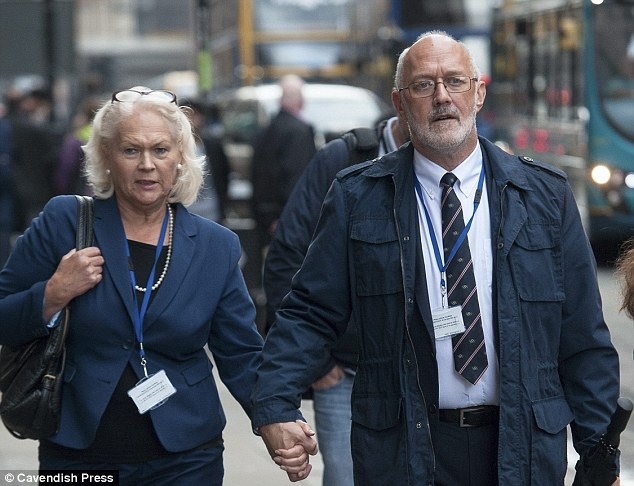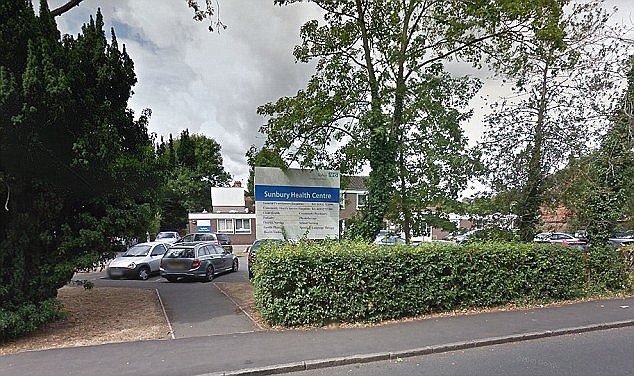A family doctor who married two of his patients after counselling them over their relationships has been suspended for three months.
Dr Simon Holmes, of Twickenham, south-west London, was treating the first woman for depression when he convinced her to leave a dating site and 'go out with him instead'.
The couple got married but then divorced, after which Dr Holmes started seeing another female patient, who he again later married.
The 59-year-old was today allowed to keep his job but he was given a period of suspension for behaviour he admitted was 'utter insanity'.
Dr Simon Holmes, pictured with his wife Ellen, has been suspended after a professional standards hearing was told he started relationships and married patients on two occasions
A Practitioners Tribunal of the General Medical Council in Manchester heard the romance with his first patient blossomed while he was a partner at St Margaret's Surgery in Twickenham from 1985.
The two had mutual friends and would mix in the same social circles, with their relationship remaining platonic until 1997, when Dr Holmes' partner passed away.
Following the death, the pair met up for lunch where Dr Holmes is said to have told the woman 'forget about the dating agency and come out with me.'
When the patient said it was too soon for him to start dating again, he added: 'How long are you going to make me wait?'
Dr Holmes admitted his behaviour was 'insanity'
Dr Holmes said the pair entered into a relationship with 'open eyes' and she soon transferred to another GP practice, after which he informed his fellow partners of the situation and some even attended their wedding.
She stated she was vulnerable at the time they got together but was also looking for a 'knight in shining armour', and the two were happily married for 13 years.
But the relationship ended in an 'acrimonious divorce' in 2013, by which time the doctor had moved to the Sunbury Health Centre in Middlesex.
While working at the surgery he began treating another woman - called Patient B during the hearing. He later asked her out for a coffee.
He soon told colleagues that he had left his wife and was getting a divorce, but didn't tell them he had started a new relationship or that it was with a patient at the practice.
Dr Holmes's actions were only uncovered the following year when a colleague updating a database noticed that he had changed his address, became suspicious, and discovered that Patient B lived with him.
He was confronted about the relationship when he returned to work from their holiday and admitted what he had done and that he had asked her to marry him.
Dr Holmes referred himself to the GMC, but matters worsened when an investigator contacted the St Margaret's to ask if he had engaged in similar conduct in the past.
His former practice in Twickenham revealed his first wife was also a former patient.
Following his professional standards hearing, panel chairman Peter Schofield said: 'You told the Panel that you were shocked when your relationship with Patient B was exposed, and that you were shocked your partners did not afford you any human compassion.
'However, you said that you do understand their reaction and do not blame them. You told the Panel that you were in a desperate situation, and felt like a trapped animal.'
The chairman added: 'During this period of time, between August 2012 and June 2013, you were under a tremendous amount of stress from your ongoing divorce, pressure of work and personal family bereavement, and felt like you were in a "bubble".'
The chairman added: 'You told the panel that with a clear mind you accept what you did was wrong. You told the panel that what you did was "utter insanity".
'The Panel was satisfied that there is no evidence to suggest that your misconduct is fundamentally incompatible with continued registration.
'You have accepted that the relationship with Patient B was wrong and the panel accepts that it arose at a time when your usual good judgement was clouded by other, extreme personal issues. The panel is satisfied that the risk of repetition of your behaviour is extremely low.
'The Panel considered that a period of suspension would be appropriate, proportionate and would be sufficient to send out a signal to the profession and the public that your conduct was unacceptable.'














No comments:
Post a Comment